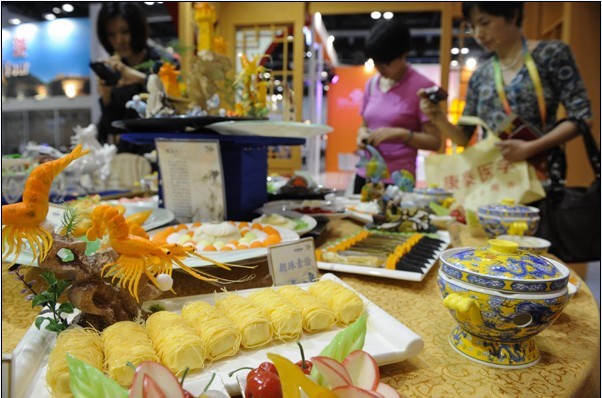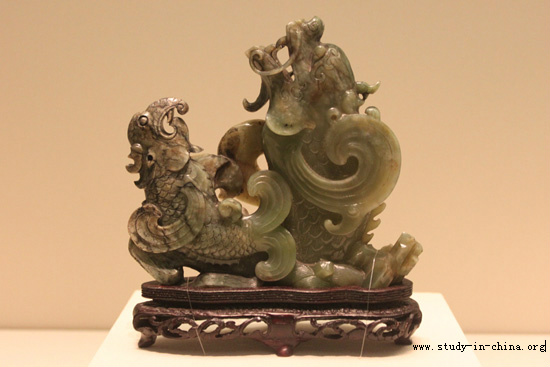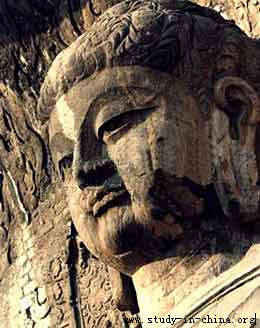| Home > China Feature |
Chinese Muslims Celebrate Corban Festival

Muslims attend a celebration feast held in a street in Nanning, capital of southwest China's Guangxi Zhuang Autonomous Region, to mark Corban Festival, also known as Eid al-adha, Nov. 17, 2010. Chinese muslims celebrate Eid al-Adha, which falls on the tenth day of the twelfth month on the Islamic calendar, to mark the end of the haj and commemorate Prophet Abraham's willingness to sacrifice his son Ismail on God's command.
YINCHUAN, Nov. 18 (Xinhua) -- Millions of Chinese Muslims across the country celebrated the tradition of Corban on Tuesday and Wednesday.
In northwest China's Ningxia Hui Autonomous Region, 76-year-old Liu Wenming attended a religious ceremony at the Nanguan Mosque in the regional capital, Yinchuan, Wednesday morning, along with some 10,000 Muslims.
"My son, daughter and grandchildren will come from different parts of Ningxia to have a family lunch with me. Then we will visit other relatives and friends," said Liu.
In Qinghai Province, also in the northwest, many Muslims began to gather at the Dongguan Mosque in the provincial capital Xining before 8 a.m. Tuesday. By 9 a.m., roads outside the mosque were packed with pious Muslims.
Ten ethnic groups in China, including Hui, Uygur, Dongxiang and Bao'an, celebrate the annual festival -- but they celebrate it on different days. Some celebrated it on Tuesday while others celebrated it Wednesday. The timing depends on each ethic group's tradition.
The Corban Festival, also known as Id al-Gurban, is a major Islamic festival that is meant to demonstrate believers' faith and obedience to Allah. People slaughter livestock and divide the animal into three parts.
One part is to be eaten by the family. Another part is for relatives and friends. The third part is for charity.
Migrant workers from northwest China's Xinjiang Uygur Autonomous Region returned home this month in time for the festival.
Eighty-seven migrant workers from Shule County returned home in early November to join their families in celebrating the joyous occasion.
Additionally, the regional government organized a reception on Tuesday afternoon, during which Zhang Chunxian, secretary of the regional committee of the Communist Party of China, met representatives from all walks of life.
At the end of his speech, Zhang greeted the Muslims while speaking in the Uygur language, which received warm applause.
China has more than 20 million Muslims. They mainly live in Xinjiang, Ningxia, Gansu, Qinghai, Yunnan, Shaanxi, Inner Mongolia and Henan.
 |
| A celebration feast free to all ethnic groups is held in a street in Nanning, capital of southwest China's Guangxi Zhuang Autonomous Region, to mark Corban Festival, also known as Eid al-adha, Nov. 17, 2010. Chinese muslims celebrate Eid al-Adha, which falls on the tenth day of the twelfth month on the Islamic calendar, to mark the end of the haj and commemorate Prophet Abraham's willingness to sacrifice his son Ismail on God's command. |
 |
| Muslims celebrate Corban Festival, also known as Eid al-adha, in Nanning, capital of southwest China's Guangxi Zhuang Autonomous Region, Nov. 17, 2010. Chinese muslims celebrate Eid al-Adha, which falls on the tenth day of the twelfth month on the Islamic calendar, to mark the end of the haj and commemorate Prophet Abraham's willingness to sacrifice his son Ismail on God's command |
 |
| A man chooses food in a market in Yinchuan, capital of northwest China's Ningxia Hui Autonomous Region, Nov. 15, 2010. Locals prepare for the upcoming Corban Festival, which falls on the 10th of the twelfth month of the Islamic calendar and is celebrated by the Chinese ethnic groups believing in Islam, including Hui, Uygur, Kazak, Ozbek and so on. |
 |
| Chinese muslims pray at a mosque to celebrate Corban Festival, also known as Eid al-adha, in Yinchuan, capital of northwest China's Ningxia Hui Autonomous Region, Nov. 17, 2010. |
 |
| Chinese muslims pray at a mosque to celebrate Corban Festival, also known as Eid al-adha, in Yinchuan, capital of northwest China's Ningxia Hui Autonomous Region, Nov. 17, 2010. |
 |
| Chinese muslims pray in the Dongguan mosque to celebrate Corban Festival, also known as Eid al-adha, in Xining, capital of northwest China's Qinghai Province, Nov. 16, 2010. Chinese muslims celebrate Corban to mark the end of the haj and commemorate Prophet Abraham's willingness to sacrifice his son Ismail on God's command. |
 |
| Chinese muslims pray in the Dongguan mosque to celebrate Corban Festival, also known as Eid al-adha, in Xining, capital of northwest China's Qinghai Province, Nov. 16, 2010. Chinese muslims celebrate Corban to mark the end of the haj and commemorate Prophet Abraham's willingness to sacrifice his son Ismail on God's command. |
Art
 more
moreChina Beijing International Diet ...
Recently, The hit CCTV documentary, A Bite of China, shown at 10:40 ...

Exhibition of Ancient Chinese Jad...
At least 8,000 years ago, Chinese ancestors discovered a beautiful...

Longmen Grottoes
The Longmen Grottoes, located near Luoyang, Henan Province, are a tr...

Custom
 more
moreWeb Dictionary
Martial Arts
Tai Chi Master Class Held in Moscow
MOSCOW, June 15, 2016 (Xinhua) -- Students learn from Shaolin ...
Celebriting 70 years' efforts in restoring Mogao...
Work is being carried out at the restoration site of cave No 98 a...
Hong Kong Children's Symphony performs in Seattle
Under the theme of Tribute to the Golden Age, a concert featuring a ...





 print
print  email
email  Favorite
Favorite  Transtlate
Transtlate 








